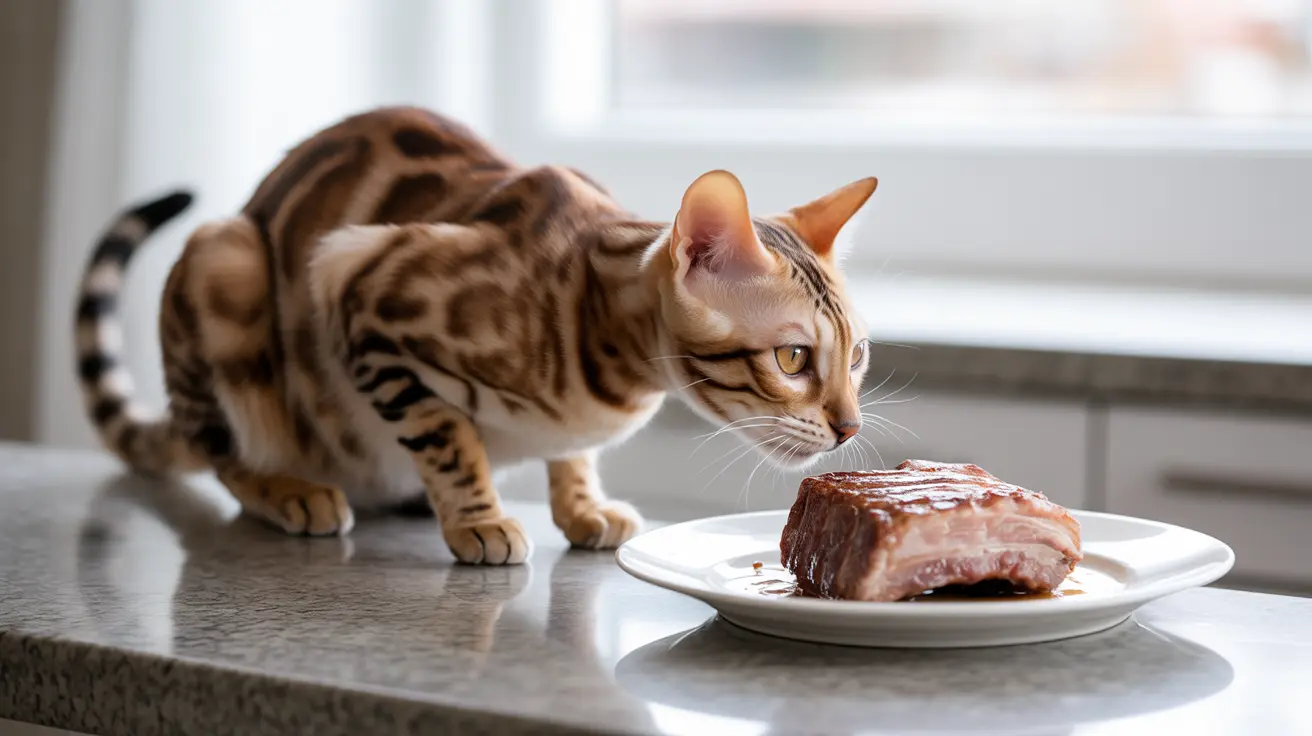Understanding the Basics of Cats and Rib Meat
Cats are obligate carnivores, meaning they require animal protein to thrive. While plain, cooked rib meat contains valuable protein (about 22.8g per 100g), it's important to understand that not all parts of ribs are safe for feline consumption.
The meat itself can provide essential nutrients, including B vitamins and minerals like iron and zinc, which support your cat's overall health. However, the way ribs are typically prepared for human consumption often makes them unsuitable for cats.
Safety Concerns and Potential Risks
Bone Hazards
The most significant danger of feeding ribs to cats comes from the bones. Whether raw or cooked, rib bones can:
- Splinter and cause internal injuries
- Create choking hazards
- Lead to dental damage
- Cause intestinal blockages or perforations
Seasoning and Preparation Risks
Common rib seasonings and marinades often contain ingredients toxic to cats, including:
- Garlic and onion powder
- High levels of salt
- Various spices that can cause digestive upset
- Sauces containing sugar or artificial sweeteners
Guidelines for Feeding Ribs to Cats
Safe Preparation Methods
If you choose to offer rib meat to your cat, follow these essential guidelines:
- Remove all bones completely
- Serve only plain, thoroughly cooked meat
- Remove all visible fat
- Avoid any seasoned portions
- Offer in small amounts as an occasional treat
Portion Control
Even when properly prepared, rib meat should only make up a tiny portion of your cat's diet. A few small pieces occasionally is sufficient, as excess consumption can lead to:
- Weight gain
- Digestive issues
- Nutritional imbalances
- Potential pancreatitis due to high fat content
Healthier Alternatives to Ribs
Instead of ribs, consider these safer protein options for your cat:
- Commercial cat treats specifically formulated for felines
- Plain, cooked chicken breast
- Small amounts of lean turkey
- Cat-specific meat-based treats approved by veterinarians
Frequently Asked Questions
Can cats safely eat pork ribs, and how should they be prepared before feeding?
Cats can only safely eat plain, thoroughly cooked pork rib meat with all bones removed. The meat should be unseasoned and free from marinades, sauces, or spices. Only offer small amounts as an occasional treat.
Why are rib bones dangerous for cats, and what health risks do they pose?
Rib bones are dangerous because they can splinter, causing choking, internal injuries, gastrointestinal blockages, or perforations. Both raw and cooked bones pose these risks, with cooked bones being especially prone to splintering.
Is it okay to feed my cat raw pork ribs, or should they always be cooked?
Never feed cats raw pork ribs. Raw pork can contain harmful bacteria and parasites that may cause serious illness. Always thoroughly cook any meat before offering it to your cat.
What are the nutritional benefits and drawbacks of giving rib meat as a treat to cats?
Rib meat provides protein and essential nutrients like B vitamins and minerals. However, it's high in fat and often prepared with seasonings unsafe for cats. The risks generally outweigh the benefits when better alternatives are available.
What symptoms indicate my cat might be suffering from bone ingestion or rib-related health issues?
Watch for symptoms such as vomiting, difficulty defecating, lethargy, loss of appetite, abdominal pain, or difficulty breathing. If you notice any of these signs after your cat consumes ribs or bones, seek immediate veterinary care.
Conclusion
While cats can technically eat plain, cooked rib meat in small amounts, the risks associated with bones and typical preparation methods make ribs a less-than-ideal treat choice. It's safer to stick with commercial cat foods and treats specifically formulated for feline nutrition. If you do choose to offer rib meat, ensure it's properly prepared and given in strict moderation.






